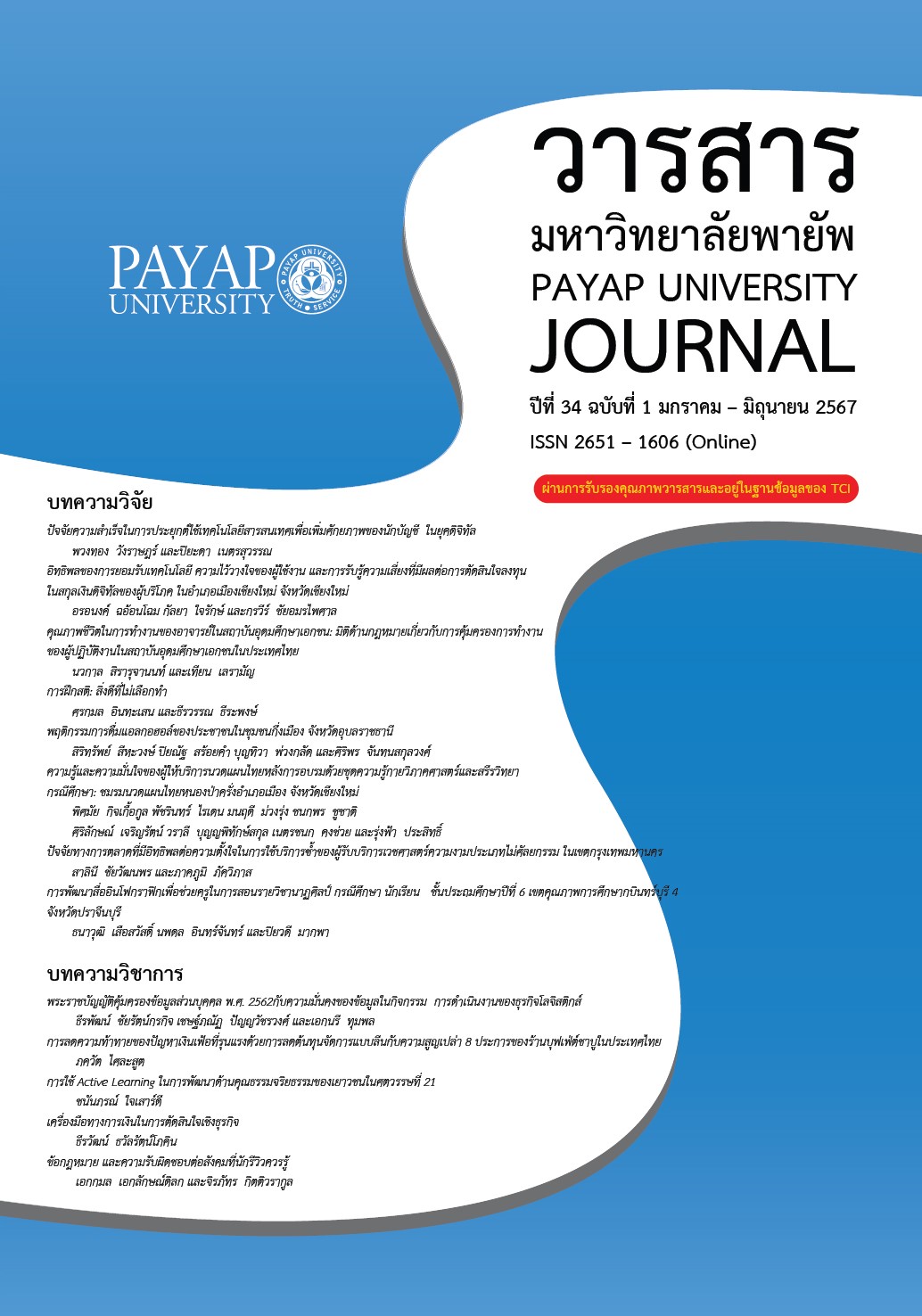การฝึกสติ: สิ่งดีที่ไม่เลือกทำ
Main Article Content
บทคัดย่อ
การวิจัยครั้งนี้มีวัตถุประสงค์เพื่อศึกษามุมมองความคิดที่เป็นสาเหตุที่ทำให้นักศึกษา เลือกที่จะไม่ฝึกสติ ผู้ให้ข้อมูลในการศึกษาครั้งนี้เป็นนักศึกษามหาวิทยาลัยเชียงใหม่ในระดับปริญญาตรี ที่ลงทะเบียนเรียนในปีการศึกษา 2563 และ 2564 และมีประสบการณ์การฝึกสติ แต่ปัจจุบัน เลือกที่จะไม่ฝึกสติจำนวน 5 ราย เก็บรวบรวมข้อมูลโดยการสัมภาษณ์เชิงลึก นำข้อมูลมาวิเคราะห์ และตีความ ผลจากการศึกษาพบว่า 1) ผู้ให้ข้อมูลรับรู้คุณประโยชน์ของการฝึกสติ 2) ผู้ให้ข้อมูล มีความรู้สึกทางลบและเจตคติที่ไม่ดีต่อเรื่องของการฝึกสติ อันเป็นผลมาจากประสบการณ์ที่เข้มงวด การถูกตำหนิและบังคับจากครอบครัวและโรงเรียน และ 3) ผู้ให้ข้อมูลขาดความเข้าใจในเรื่องการฝึกสติที่ดีพอ เนื่องจากมีมุมมองความคิดที่ว่าการฝึกสตินั้นมีกฎเกณฑ์ ระเบียบ แบบแผนที่ตายตัว บางครั้ง การปฏิบัติตามแบบแผนทำให้เกิดความเจ็บปวดและเมื่อยล้า และการปฏิบัตินั้นต้องใช้เวลานาน เบียดบังเวลาที่ใช้ในชีวิตประจำวัน ส่งผลให้นักศึกษาเลือกที่จะไม่ฝึกสติ
Article Details
เอกสารอ้างอิง
จิราภรณ์ ตั้งกิตติภาภรณ์. (2559). จิตวิทยาบุคลิกภาพและพฤติกรรมสุขภาพ. จุฬาลงกรณ์มหาวิทยาลัย.
ดาวชมพู นาคะโร, พลภัทร์ โล่เสถียรกิจ, และศิริจิต สุทธจิตต์. (2556). จิตบำบัดด้วยสติ (Mindfulness -based Psychotherapy). โรงพิมพ์แสงศิลป์.
นัท ฮันต์, ติช (2544). สันติภาพทุกย่างก้าว. (พิมพ์ครั้งที่ 4). ศยาม.
ธีรวรรณ ธีระพงษ์ และอาคม สานุวิตร์. (2558). การศึกษาความเป็นไปได้ในการเปิดหลักสูตรระดับปริญญาโทนานาชาติ สาขาสติกับการพัฒนามนุษย์. มหาวิทยาลัยเชียงใหม่.
ธัญวัฒน์ อิพภูดม. (2562). เมื่อจิตใจเด็กไม่ใช่ของเล่น จำเป็นไหมที่ค่ายธรรมะต้องบีบค้นอารมณ์จนทำให้เด็กร้องไห้. The MATTER. https://thematter.co/social/dhamma-camp-question/79839
ประสาท สุขเกษม. (2542). บทบาทของพระภิกษุของพระภิกษุสงฆ์ในการขัดเกลาทางสังคมแก่เยาวชน : กรณีศึกษาค่ายคุณธรรมวัดอุโมงค์ จังหวัดเชียงใหม่ [วิทยานิพนธ์ปริญญาศึกษาศาสตรมหาบัณฑิต ไม่ได้ตีพิมพ์]. มหาวิทยาลัยเชียงใหม่.
มหาวิทยาลัยเชียงใหม่ คณะมนุษยศาสตร์ ภาควิชาจิตวิทยา. (2554). จิตวิทยาทั่วไป. โครงการตำรามหาวิทยาลัยเชียงใหม่.
เมลดา กลิ่นมาลี. (2554). นักศึกษากับปัญหาความเครียด. วารสารการอาชีวะและเทคนิคศึกษา, 1(1), 64-70. https://ojs.kmutnb.ac.th/index.php/JVTE/article/view/1674/1189
ยงยุทธ วงศ์ภิรมย์ศานติ์. (2555). การพัฒนาจิตตปัญญาในองค์กร (การปรับกระบวนการทัศน์และวัฒนธรรมองค์กร)= Spirituality development in organization. เอ. พี. กราฟฟิคดีไซน์และการพิมพ์.
รัตนาภรณ์ ชูทอง, ภควัต วิวัฒนวรเศรษฐ์, ณภัควรรต บัวทอง, ยุพา หนูทอง, ชาตินันท์ อยู่สุข,
ญัฐกุล รุ่งเรือง, นพดล หมัดอาหวา, พีระสิทธิ์ แซ่ลิ้ม, แพรนภา ชัยทวีทรัพย์, ภัทรเนตร ชีเจริญ,
เรณูกา จันทร์สุวรรณ, และองค์อร สรายุทธพิทักษ์. (2562). ภาวะสุขภาพจิต สภาพและการปฏิบัติหน้าที่ของครอบครัวในนักศึกษาระดับปริญญาตรีของมหาวิทยาลัยแห่งหนึ่ง ภาคใต้ของประเทศไทย. วารสารสมาคมจิตแพทย์แห่งประเทศไทย, 64(4), 337-350.
https://www.psychiatry.or.th/JOURNAL/64-4/04_Rattanaporn.pdf
ลลิดา ภู่ทอง. (2560). ผลของการฝึกสติของนักศึกษาภาควิชาภาษาอังกฤษ มหาวิทยาลัยแม่โจ้. วารสารศิลปศาสตร์ มหาวิทยาลัยแม่โจ้, 5(2), 85-98. https://so03.tci-thaijo.org/index.php/liberalartsjournal/article/view/128665
วารีรัตน์ ถาน้อย, ศิรดา เกษมศรี, ฐินีรัตน์ ถาวร, และนพพร ว่องสิริมาศ. (2561). ปัจจัยทำนายการมีสติในนักศึกษาระดับอุดมศึกษา. วารสารพยาบาลจิตเวชและสุขภาพจิต, 32(2), 130-144. https://he02.tci-thaijo.org/index.php/JPNMH/article/view/138718
วิลาวัลย์ วีระอาชากุล และวิบูลย์ วีระอาชากุล (2561). ปัจจัยสัมพันธ์กับความเครียดในนักศึกษาทันตแพทย์ชั้นปีที่4-6 คณะทันตแพทย์ มหาวิทยาลัยขอนแก่น. วารสารสมาคมประสาทวิทยาศาตร์ ภาคตะวันออกเฉียงเหนือ, 13(3), 11-20. https://opac.kku.ac.th/catalog/ArticleItem.aspx?JMarcID=j00284512
สุขิริณณ์ อามาตย์บัณฑิต, เสริมศรี ไชยศร, และวีณา วโรตมะวิชญ. (2561). โปรแกรมการฝึกสติที่เน้นหลักการแบบมุ่งรู้จริงทำได้สร้างความฉลาดทางอารมณ์ของนิสิตฝึกประสบการณ์วิชาชีพครูมหาวิทยาลัยมหาสารคาม. วารสารวัดผลการศึกษามหาวิทยาลัยมหาสารคาม, 24(1), 313-329. https://so02.tci-thaijo.org/index.php/jemmsu/article/view/146924
แสงทอง ธีระทองคำ และทัศนา ทวีคูณ. (2553). ผลของการฝึกอารมณ์พัฒนาจิตต่อความเครียดและสมรรถนะแห่งการมีสติของนักศึกษาพยาบาลรามาธิบดี. รามาธิบดีพยาบาลสาร, 16(3), 364-377. https://he02.tci-thaijo.org/index.php/RNJ/article/view/8991
Ching, H.-H., Koo, M., Tsai, T.-H., & Chen, C.-Y. (2015). Effects of a mindfulness meditation course on learning and performance among university students in Taiwan. Evidence-based Complementary and Alternative Medicine, 2015(7), 1-7. https://doi.org/10.1155/2015/254358
Gryffin, P., Chen, W., & Erenguc, N. (2014). Knowledge, attitudes and beliefs of meditation in college students: Barriers and opportunities. American Journal of Education Research, 2(4), 189-192. https://DOI: 10.12691/education-2-4-2
Lazarus & Folkman. (1984). Stress appraisal and coping. Springer Publishing.
Kabat‐Zinn, J. (1994). Wherever you go, there you are: Mindfulness meditation in everyday life. Hyperion.
Rizer, C. A., Fagan, M. H., Kilmon, C. & Rath, L. (2016). The Role of perceived stress and health beliefs on college students’ intentions to practice mindfulness meditation. American Journal of Health Education, 47(1), 24-31. https://DOI:10.1080/19325037.2015.1111176
Valley, M. & Stallones, L. (2018). A Thematic analysis of health care workers’ adoption of mindfulness practices. Workplace Health & Safety, 66(11), 538-544. https://doi.org/10.1177/2165079918771991
Vidic, Z., & Cherup, N. (2019). Mindfulness in classroom: Effect of a mindfulness-based relaxation class on college students' stress, resilience, self-efficacy and perfectionism. College Student Journal, 53(1), P.130-142. https://psycnet.apa.org/record/2019-17784-013


